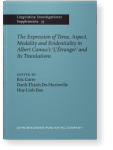Part of
The Expression of Tense, Aspect, Modality and Evidentiality in Albert Camus’s L'Étranger and Its Translations / L'Étranger de Camus et ses traductions : questions de temps, d'aspect, de modalité et d'évidentialité (TAME): An empirical study / Etude empiriqueEdited by Eric Corre, Danh Thành Do-Hurinville and Huy Linh Dao
[Lingvisticæ Investigationes Supplementa 35] 2020
► pp. 59–73
